

Pratiques anti-oppressives auprès des jeunes trans. Avant-propos Dans plusieurs milieux de travail, des travailleuses sociales et travailleurs sociaux sont en contact avec des jeunes transgenres et leurs familles.

En centres jeunesse, en première ligne, au sein d’organismes communautaires ou même en pratique autonome, ces professionnels sont souvent mal outillés pour bien comprendre ce que vivent ces personnes et risquent d’intervenir en négligeant des aspects essentiels de la situation ou en mettant l’accent sur des dimensions moins importantes. Le but de ce dossier est donc d’outiller les travailleurs sociaux afin qu’ils puissent intervenir efficacement auprès des enfants transgenres et de leurs familles. Brochure jeunes trans web 2. On Liking Women. Once a week, for a single semester of high school, I would be dismissed early from class to board the athletics bus with fifteen teenage girls in sleek cap-sleeved volleyball jerseys and short shorts.
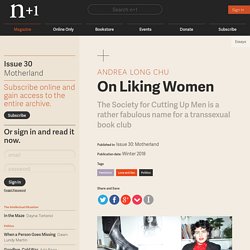
I was the only boy. Occasionally a girl who still needed to change would excuse herself behind a row of seats to slip out of her school uniform into the team’s dark-blue colors. For more minor wardrobe adjustments, I was simply asked to close my eyes. In theory, all sights were trained on the game ahead where I, as official scorekeeper, would push numbers around a byzantine spreadsheet while the girls leapt, dug, and dove with raw, adolescent power.
Identité sexuelle : « C'est quoi ton genre? » Seasons of gender: reflections on trans day of remembrance. Gender can be a daunting topic – daunting for trans and cis people alike. for the latter, discussing gender can seem difficult. anxiety-provoking. tentative to engage, cis people often avoid asking about pronouns, avoid trying with pronouns, avoid learning about gender altogether. all this employed in the spirit of fragility: as if it is better to evade and notfuckup than it is to make a mistake and sit in the unease of learning. yet the anxiety of gender, for cis people, simply ends there. for the former, gender anxiety is a different reality.
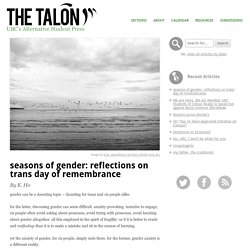
Still Think Trans Women Have Male Privilege? These 7 Points Prove They Don’t. The debate is fierce, bitter, and as old second wave feminism: Do trans women experience male privilege?
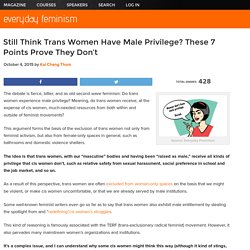
Meaning, do trans women receive, at the expense of cis women, much-needed resources from both within and outside of feminist movements? This argument forms the basis of the exclusion of trans women not only from feminist activism, but also from female-only spaces in general, such as bathrooms and domestic violence shelters. The idea is that trans women, with our “masculine” bodies and having been “raised as male,” receive all kinds of privilege that cis women don’t, such as relative safety from sexual harassment, social preference in school and the job market, and so on. As a result of this perspective, trans women are often excluded from women-only spaces on the basis that we might be violent, or make cis women uncomfortable, or that we are already served by male institutions.
Trans Women Are Women. Why Do We Have to Keep Saying This? Caitlin Jenner posing on the cover of Vanity Fair.

This Sunday, the New York Times ran an op-ed by feminist filmmaker and journalist Elinor Burkett, titled "What Makes a Woman? " The piece voices Burkett's manifold complaints with the trans equality movement, focusing specifically on the ways trans women like Caitlyn Jenner express femininity and the manner in which trans visibility redefines the term "woman.
" For trans women, Burkett's arguments are, sadly, nothing new. But with the recent explosion of trans visibility in mainstream culture, it feels important to offer a response. Second-wave feminist thought was largely "trans exclusionary," meaning its members often expressed a refusal to see trans women as women. Theconversation. I will start by asking two questions: at what age did you know your gender, and do you think someone else had to tell you what it was?
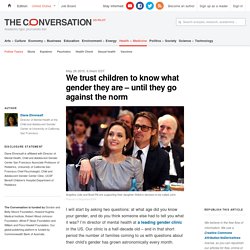
I’m director of mental health at a leading gender clinic in the US. Our clinic is a half-decade old – and in that short period the number of families coming to us with questions about their child’s gender has grown astronomically every month. When you're trans, every choice to be more feminine could mean life or death.
I’ve worn these boots down to the heel base – the wooden part to which the soles are nailed.

I should take them in to be re-soled, because every step I take on the mangled pavement whittles away another percentage point of the shoe repair guy’s prognosis of its potential to be made anew. But I don’t run as well in the sea green patent leather Mary Jane pumps that I’d have to wear while these were in the shop. When I was young, newly out – “fresh out of the oven” as we older trans ladies often say, giggling behind glasses of wine in kitchens while hordes of brunching baby queers roam the sunlit streets – I mistook the rush of purchasing a new pair of girly-girl heels for the thrill of freedom fought and won.
But now I know I could be killed in these shoes. A man’s plan to “rid the community of these Aids-ridden faggots” is made more actionable when that “faggot” has to pull off her shoes to run away. Judith Butler addresses TERFs and the work of Sheila Jeffreys and Janice Raymond. Judith Butler is a preeminent gender theorist and has played an extraordinarily influential role in shaping modern feminism.

She’s written extensively on gender and her concept of gender performativity is a central theme of both modern feminism and gender theory. Butler’s essays and books include Performative Acts and Gender Constitution (1988), Gender Trouble: Feminism and the Subversion of Identity (1990), Bodies That Matter: On the Discursive Limits of “Sex” (1993) and Undoing Gender (2004). However, the concept of gender perfomativity has been used – and some would assert – abused to support a number of positions that misconstrues Butler’s work.
I therefore wanted to ask Butler about what she really thinks about gender and the trans experience. Along the way Butler specifically addresses TERFs and the work of Sheila Jeffreys and Janice Raymond. 3 Common Feminist Phrases That (Unintentionally) Marginalize Trans Women. New Narratives 2014: Reframing the conversation. A feminist critique of “cisgender” La transphobie, ça va faire! The New Yorker’s Skewed History of Trans-Exclusionary Radical Feminism Ignores Actual Trans Women. Media coverage of transgender issues has increased rapidly in the last few years as trans people have made larger and louder pushes for relatively basic rights and recognition.
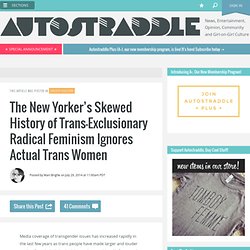
Unfortunately, as ground is gained in the fight for trans acceptance, the opposition to that progress only grows more louder and more aggressive. The Dispute Between Radical Feminism and Transgenderism. On May 24th, a few dozen people gathered in a conference room at the Central Library, a century-old Georgian Revival building in downtown Portland, Oregon, for an event called Radfems Respond.
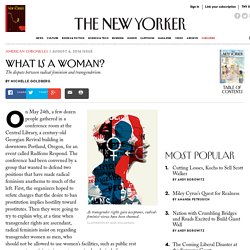
The conference had been convened by a group that wanted to defend two positions that have made radical feminism anathema to much of the left. First, the organizers hoped to refute charges that the desire to ban prostitution implies hostility toward prostitutes. Then they were going to try to explain why, at a time when transgender rights are ascendant, radical feminists insist on regarding transgender women as men, who should not be allowed to use women’s facilities, such as public rest rooms, or to participate in events organized exclusively for women. The dispute began more than forty years ago, at the height of the second-wave feminist movement. In this view, gender is less an identity than a caste position. Teaandfeminism.tumblr. De la transphobie au paternalisme en passant par le "cissplaining" by Gabbrielle.
Transsexualité et privilèges masculins : fiction ou réalité ? La reconnaissance des différents corps, parcours et expériences des personnes trans* dans le discours populaire. Les personnes ayant un parcours trans* intéressent le public depuis des décennies. Toutefois, il est rare que leur expérience soit rapportée au public par des personnes ayant elles-mêmes un parcours trans*, définissant le corps, l’expérience et le parcours des personnes concernées selon une compréhension binaire et hétérosexiste.
Cet article se veut une introduction et un guide à l’intention de celles et ceux qui s’intéressent aux différents enjeux liés à ces individus, qu’elles et ils oeuvrent dans le domaine médiatique, culturel ou communautaire. Bite Me, Beautiful, dreamsofamadgirl: thenarius: Ongoing on... 13 Myths and Misconceptions About Trans Women: Part One. Garçon manqué. Éloi a toujours été un garçon dans sa tête, malgré son corps de fille. Tender hearted: sistahmamaqueen: noetherian: unobject: ...
Transgender comedian Avery Edison held at Toronto airport, tweets her way through. At 5:23 p.m. yesterday, British comedian Avery Edison was detained at Pearson International Airport after flying to Toronto to visit her girlfriend. On its face, this was a routine detainment—she reports that she was prevented from coming into Canada because she had overstayed her student visa on a previous visit—but thanks to the magic combination of Twitter, Pearson’s free wifi and Edison’s wit, the situation resulted in an eight-hour tweet-a-thon detailing every twist and turn of the case.
Trans Woman Sent to Men’s Prison. Comedian Avery Edison arrived at Pearson airport and wound up in a men's prison, highlighting ongoing trans equity issues. By Sarah Sweet , and David Hains Photo by Pat Dryburgh via Flickr. Thelocalwhore: My province slaying the world. Garneau - Ignorancentrisme, dévaloriser le savoir des LGBT+ Tender hearted: tooyoungforthelivingdead: Beautiful photo series...
Enfant en premier, genre en second. We Think He Might Be a Boy - Friends Journal. Tiny Tornado after a recent trip to the barbershop. I am at the dining room table, and my five-year-old is in the bathroom. After a bit, I realize that the water has been running for much longer than it takes for him to wash his hands. Buzzfeed: Everything you wanted to know about. Preferred Gender Pronouns: Obnoxious? (No) The LGBT community has made major strides in the last 10 years in terms of legal rights and social acceptance.
Even the transgender community, the most often neglected letter of the acronym, has seen some major wins lately. People seem to finally start being able to wrap their head around the idea of a transsexual person-so long as they still up hold the dichotomy of male/female.